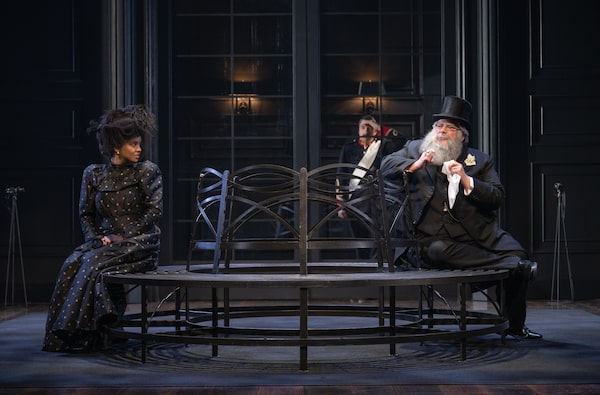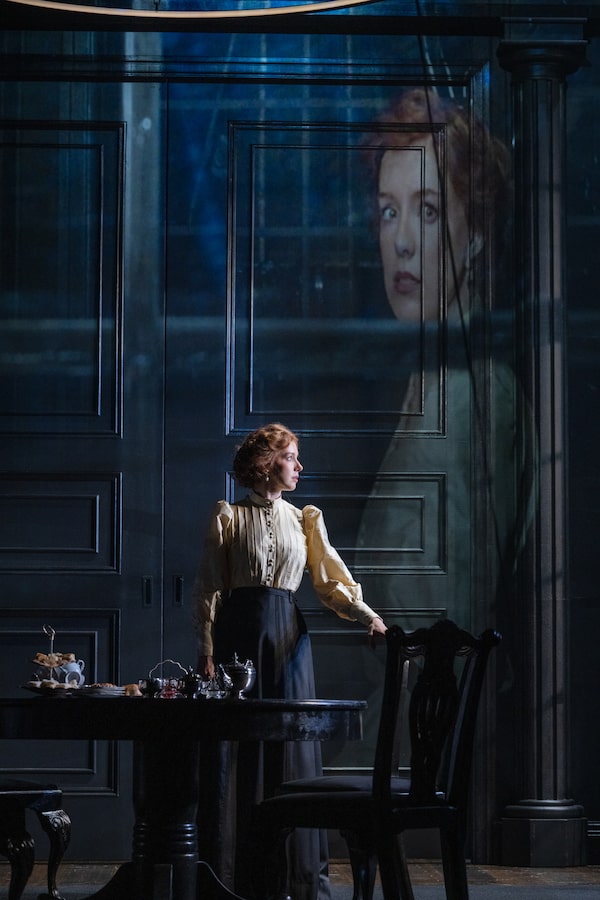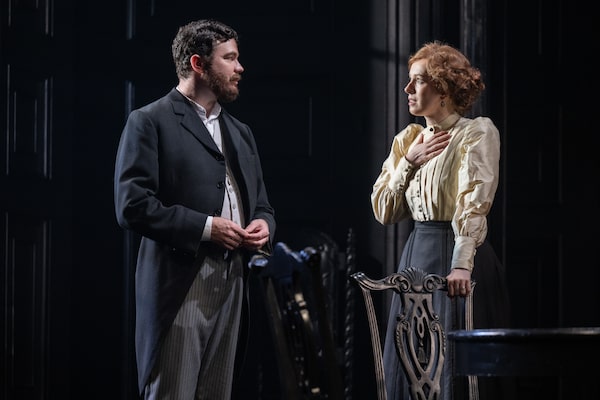
Rais Clarke-Mendes as Mrs. Lingard and Neil Barclay as Lord Uske with Richard Lam as Captain Dullaston in The Shadow of a Doubt.Shaw Festival
- Title: The Shadow of a Doubt
- Written by: Edith Wharton
- Director: Peter Hinton-Davis
- Actors: Katherine Gauthier, Patrick Galligan, André Morin and Tara Rosling
- Company: The Shaw Festival
- Venue: Royal George Theatre
- City: Niagara-on-the-Lake, Ont.
- Year: until Oct. 15.
Edith Wharton’s The Shadow of a Doubt, never staged in her lifetime, is a highly unusual play.
First, there is it’s odd history: It was all ready to go in 1901, soon after Wharton wrote it, when her producer abandoned the Broadway production. Then the script lay hidden in her papers at the University of Texas until discovered by two researchers in 2016. The production now showing at the Shaw Festival is a world premiere of a forgotten drama.
All The Globe’s reviews from the 2023 Stratford Festival and Shaw Festival so far
And the script itself is also odd: part psychological thriller, part melodrama, part comedy. It harkens back to Oscar Wilde, with sharp satire delivered in glittering one-liners, and looks forward to Daphne du Maurier’s Rebecca, both plays haunted by the ghosts of first wives. It has both the social critique and the wit for which Wharton’s later novels (House of Mirth; Age of Innocence) are famed, but it’s a dark mix of these elements.
It is not currently known why the original production was dropped, but one can hazard a guess or two as to why an impresario might have had cold feet: The play deals in part with the difficult subject of euthanasia, still taboo at the turn of the 20th century; and while its third act takes place in the frigid garret so beloved of melodrama, the ending that follows is not conventional by any means.

Katherine Gauthier stars as Kate Derwent, at whom Gauthier excels in making the misunderstood woman upright rather than prissy.Shaw Festival
Director Peter Hinton-Davis’s solution is a highly mannered production: Thanks to set and costume designer Gillian Gallow, the actors first appear dressed all in black in an entirely black room, and reveal the awkwardness of the play’s domestic situation through a brittle delivery style. This takes a while to settle, or perhaps it just takes a while for the viewer to acclimatize, but ultimately it reveals its wisdom and makes a strong argument for the newly discovered script as more than worthy of the stage.
With help from video designer Haui, Hinton-Davis’s largest device is to train cameras on his cast and project these live video images of their oversized faces on the black surfaces of the set. In particular Claire Julien, in the almost silent part of a maid, gives us long, penetrating looks before any action begins.
That action surrounds the tarnished happiness of the newlywed Kate Derwent, second wife to aspiring diplomat John Derwent (André Morin) and stepmother to his daughter Sylvia (played alternately by Chloe Bowman and Julia Thompson). The new family returns from a prolonged honeymoon on the continent to the London house of the man who was the father of the first Mrs. Derwent. Lord Osterleigh (Patrick Galligan), still grieving his daughter’s death, is a snob who resents Kate, merely a nurse before her marriage, and distrusts her motivations in marrying Derwent, his protégé and former son-in-law.
And yet Kate, who is bright, loving and unpretentious, could not seem further from the personality of a gold digger, as she does her best to find her place in a unwelcoming household. There follows a classic melodrama featuring buried secrets and a blackmailing doctor (Damien Atkins) as well as a dark social drama, exposing Osterleigh’s prejudices, shot through with sudden beams of witty comedy.

That action of the play surrounds the tarnished happiness of the newlywed Derwent, second wife to aspiring diplomat John Derwen, played by André Morin, left.Shaw Festival
Hinton-Davis draws fine performances from a strong ensemble whose players weave together these various elements. Tara Rosling offers a particularly nuanced reading of Osterleigh’s good friend, Lady Uske: She has the best lines in the play, as she drops Wildean witticisms about marriage and society, yet delivers them with a certain harshness, never losing the seriousness needed to play Osterleigh’s sometimes unwilling assistant in his plot to get rid of Kate. She is key to a production that shows how the melodrama and the comedy are two sides of the same social critique.
Similarly, Galligan brings depth and reasonableness to Osterleigh’s dastardly logic, raising the character far above the mustachio-twirling villain his actions might suggest. Instead of silently booing the character, you come to understand how his mind works.
And Gauthier excels in making the misunderstood Kate upright rather than prissy, and bringing real feeling to her overblown sorrows. Her final speech, magnificently defiant as she rejects the society she has married into, reveals Wharton’s larger purpose – just as those oversized video projections finally make good sense.
 Kate Taylor
Kate Taylor